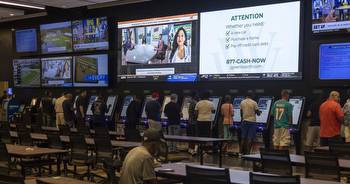SPORTS BETTING IN KENTUCKY AND WHAT IT MEANS FOR HORSE RACING

By HRI Foreign Staff — The Commonwealth of Kentucky, long renowned for its prestigious horse racing history, has embarked on a new chapter with the legalization of online sports betting. As the virtual doors to betting platforms swing open, the impact on the state’s venerable horse racing industry is a subject of considerable speculation.
This article delves into the multifaceted implications of this legislative shift, examining how the convenience of online wagering could reshape the landscape of horse racing in Kentucky.
The Dawn of a New Betting Era in Kentucky: A Legislative Milestone
March 31 marked a significant legislative milestone for Kentucky as it sanctioned online sports betting. This move not only reflects a broader national trend toward embracing digital wagering but also signals a potential shift in the state’s gambling culture.
With a legal framework now in place, the focus turns to the operational aspects of this budding industry, with retail locations opening their doors on September 7, paving the way for the online betting platforms that followed suit on September 28.
A Historical Context of Horse Racing: Kentucky’s Storied Pastime
To appreciate the magnitude of this development, one must understand Kentucky’s deep-rooted connection to horse racing. Synonymous with iconic events like the Kentucky Derby, the state’s identity is intertwined with the sport of kings.
Horse racing isn’t merely a pastime in Kentucky; it’s a cultural cornerstone that has historically drawn locals and tourists alike to the hallowed tracks of Churchill Downs and Keeneland. This longstanding tradition is now poised to intersect with the modernity of online sports betting.
Adapting to the Digital Shift: The Convenience of Home Betting
The introduction of online sports betting ushers in an era of unprecedented convenience for bettors. No longer tethered to physical locations, Kentuckians can now engage in wagering from the comfort of their homes. This shift to digital platforms presents a dual-edged sword for horse racing venues.
On one hand, it opens the floodgates to a wider audience, potentially drawing new patrons to the allure of horse racing. On the other, it poses a challenge to the traditional model of on-site betting and the unique ambiance of race day experiences.
The Economic Implications: Revenue Streams and Redistribution
The legalization of online sports betting is poised to generate significant revenue for the state, part of which could be channeled toward supporting the horse racing industry. This potential influx of funds can be a boon, offering a financial lifeline to tracks and facilities that might experience a downturn in physical attendance.
The economic repercussions extend beyond the tracks, potentially influencing job creation, tourism, and a myriad of businesses tied to the racing ecosystem.
The Impact on Horse Racing Venues

As Kentucky embraces the era of online sports betting, a spotlight shines on the traditional bastions of gambling within the state: the horse racing venues. These institutions, steeped in history and tradition, now face the dawn of a digital transformation that could redefine their operations and patron experiences.
This section explores the potential ramifications of online sports betting on these iconic venues, delving into aspects such as foot traffic, betting behaviors, and the industry’s adaptive strategies. Insights from key industry figures will offer a window into the current state of affairs and the anticipations for the future of horse racing in Kentucky.
A Question of Foot Traffic
A pressing question lingers: will the convenience of online betting deter racegoers from visiting the tracks? While the allure of betting from home is undeniable, it’s worth considering that horse racing offers an immersive experience that transcends mere wagering.
The social aspect, the thunderous roar of hooves, and the spectacle of race day are elements that digital platforms cannot replicate. Horse racing venues may need to capitalize on these unique selling points to maintain their appeal in the face of online competition.
An Operator CEO’s Perspective
Insights from industry leaders can provide a clearer picture of the situation. Churchill Downs CEO Bill Carstanjen offered his perspective in a recent interview with BetKentucky.com:
“Sports wagering in Kentucky is what Kentuckians wanted, and we were proud to help lobby and push so that it can be delivered across the state. When it comes to the retail presence that we have, it’s been good… I can’t say that we’ve seen an impact on wagering on the horses, but I also would say that it’s way too early to reach that conclusion. Let’s wait and see when we get into the spring and we’re running the Churchill spring meet when Churchill Downs racetrack itself isn’t under massive construction like it is now.”
Carstanjen’s observations underscore the complexity of predicting how online betting might affect foot traffic at race tracks. The CEO notes that, despite the burgeoning presence of retail sports betting, it is premature to determine its impact on horse wagering. Furthermore, he suggests that external factors, such as the ongoing construction at Churchill Downs, must be considered when evaluating changes in betting behavior and attendance.
This measured approach echoes the sentiment that while online betting offers convenience, the unique experience of a live horse race is irreplaceable, and its future patronage will be influenced by a variety of factors, not solely the advent of digital wagering platforms.
The Financial Impact of Legalized Sports Betting in Kentucky
Since the introduction of legalized sports betting, Kentucky has seen a significant surge in wagering activity. This section delves into the financial implications of this newfound betting landscape, examining the revenue generated and its distribution across different betting platforms.
Governor Beshear’s Financial Update
On October 23, Governor Andy Beshear shared an enlightening update on Kentucky’s sports betting landscape, revealing impressive figures that underscore the swift embrace of this new form of entertainment by the state’s residents. Since the inauguration of the first sportsbooks over six weeks prior, Kentucky’s bettors have placed wagers amounting to a staggering sum exceeding $248 million.
A remarkable insight from Governor Beshear’s report highlighted the predominant role of Kentucky’s online sports betting applications in driving this volume. Accounting for a lion’s share of the total bets, online platforms saw more than $232.3 million in wagers placed through nearly half a million active accounts. These impressive figures were contributed by the seven licensed online operators that went live on September 28.
In contrast, the state’s physical sportsbooks, strategically positioned at racetracks and historical horse racing gaming halls, have witnessed more than $15.7 million in wagers since they first opened on September 7. This discrepancy not only illustrates the burgeoning popularity of online betting but also indicates a significant shift in the gambling habits of Kentuckians, with convenience and accessibility likely playing pivotal roles.
Promotional Strategies in the Digital Age
In a savvy move to bridge the digital divide, promotional strategies like the Caesars Sportsbook Kentucky promo code are being employed. Such initiatives not only incentivize online betting but also serve as a nod to partnerships between traditional horse racing entities and digital platforms. These collaborative efforts could prove instrumental in driving engagement and fostering a symbiotic relationship between the old and the new.
Innovation in Horse Racing: Embracing Technological Advancements
Innovation is key to the survival and prosperity of any industry facing technological disruptions. The horse racing sector in Kentucky is no exception. By integrating advanced betting options, enhancing digital presence, and leveraging data analytics, tracks can elevate the race day experience, both in-person and online.
This forward-thinking approach could be pivotal in attracting a new generation of racegoers and bettors, ensuring the sport’s relevance in the digital era.
Responsible Gambling and Regulation: Safeguarding the Betting Ecosystem
With great power comes great responsibility, and the realm of online sports betting is no exception. Kentucky’s foray into this sector necessitates a robust regulatory framework to ensure responsible gambling practices.
Protecting consumers from the pitfalls of addiction and ensuring fair play are paramount concerns that must be addressed. The integrity of both sports betting and horse racing hinges on the implementation of stringent regulatory measures and the promotion of ethical gambling habits.
The Future of Horse Racing in Kentucky: Navigating Uncharted Waters

As Kentucky ventures into the uncharted waters of online sports betting, the future of horse racing hangs in a delicate balance. Will the industry seize the opportunities presented by this digital revolution, or will it succumb to the challenges? The answer lies in the industry’s ability to adapt, innovate, and reinvent itself. By embracing the new while honoring the old, horse racing in Kentucky can thrive, ensuring its legacy endures in the digital age.
In conclusion, the legalization of online sports betting in Kentucky is a watershed moment with far-reaching implications for the horse racing industry. The outcome will hinge on the sector’s adaptability, innovation, and the strategic partnerships it forms. As the starting gates open to this new era, all eyes are on the Bluegrass State as it navigates the intersection of tradition and technology in the world of horse racing.



































